For the 2025 school year, there is 1 public preschool serving 342 students in West Noble School Corporation School District.
Public Preschools in West Noble School Corporation School District have a diversity score of 0.52, which is less than the Indiana public preschool average of 0.56.
Minority enrollment is 55% of the student body (majority Hispanic), which is more than the Indiana public preschool average of 36% (majority Hispanic).
Overview
This School District
This State (IN)
# Schools
4 Schools
605 Schools
# Students
2,184 Students
264,424 Students
# Teachers
137 Teachers
17,629 Teachers
Student : Teacher Ratio
16:1
16:1
District Rank
West Noble School Corporation School District, which is ranked within the bottom 50% of all 394 school districts in Indiana (based off of combined math and reading proficiency testing data) for the 2021-2022 school year.
The school district's graduation rate of 90-94% has increased from 85-89% over five school years.
Overall District Rank
#226 out of 400 school districts
(Bottom 50%)
(Bottom 50%)
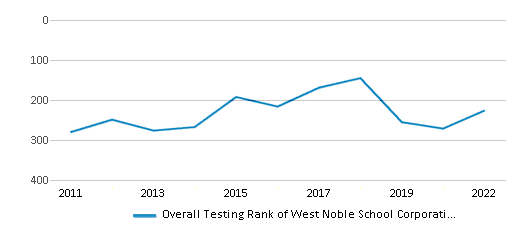
Math Test Scores (% Proficient)
36%
38%
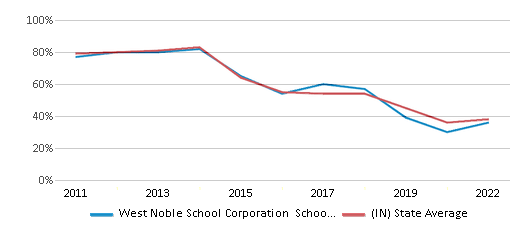
Reading/Language Arts Test Scores (% Proficient)
33%
41%
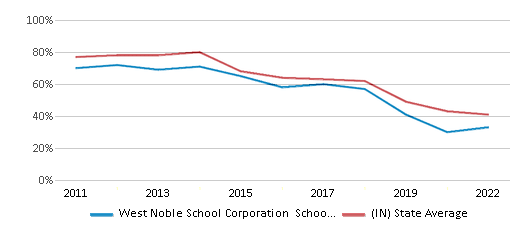
Science Test Scores (% Proficient)
21%
34%
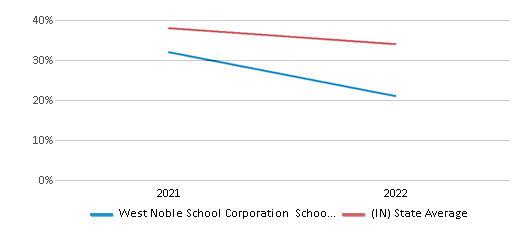
Graduation Rate
90-94%
88%
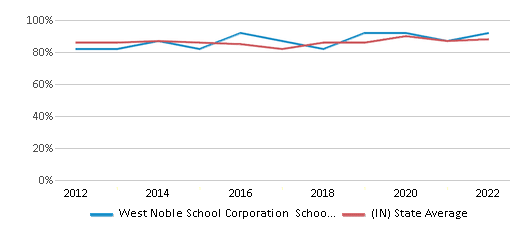
Students by Ethnicity:
Diversity Score
0.51
0.56
# American Indian Students
2 Students
409 Students
% American Indian Students
n/a
n/a
# Asian Students
10 Students
7,922 Students
% Asian Students
n/a
3%
# Hispanic Students
1,200 Students
39,591 Students
% Hispanic Students
55%
15%
# Black Students
5 Students
30,755 Students
% Black Students
n/a
12%
# White Students
951 Students
169,241 Students
% White Students
44%
64%
# Hawaiian Students
n/a
312 Students
% Hawaiian Students
n/a
n/a
# Two or more races Students
16 Students
16,194 Students
% of Two or more races Students
1%
6%
Students by Grade:
# Students in PK Grade:
20
22,837
# Students in K Grade:
168
40,190
# Students in 1st Grade:
154
40,513
# Students in 2nd Grade:
157
40,311
# Students in 3rd Grade:
170
37,170
# Students in 4th Grade:
161
37,119
# Students in 5th Grade:
145
27,784
# Students in 6th Grade:
154
11,600
# Students in 7th Grade:
147
1,191
# Students in 8th Grade:
184
1,197
# Students in 9th Grade:
195
1,093
# Students in 10th Grade:
174
1,194
# Students in 11th Grade:
183
1,100
# Students in 12th Grade:
166
1,012
# Ungraded Students:
6
113
District Revenue and Spending
The revenue/student of $12,006 in this school district is less than the state median of $13,214. The school district revenue/student has stayed relatively flat over four school years.
The school district's spending/student of $10,918 is less than the state median of $12,844. The school district spending/student has stayed relatively flat over four school years.
Total Revenue
$26 MM
$13,615 MM
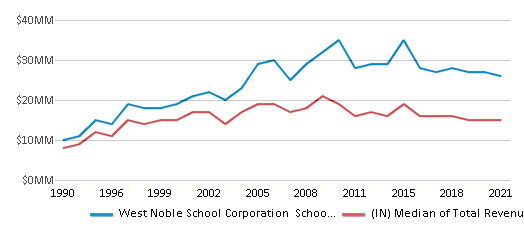
Spending
$24 MM
$13,234 MM
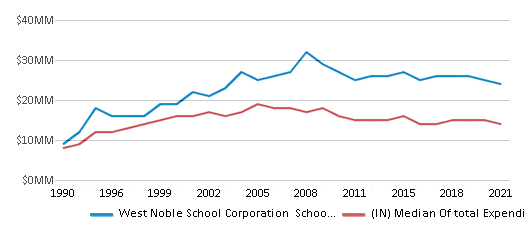
Revenue / Student
$12,006
$13,214
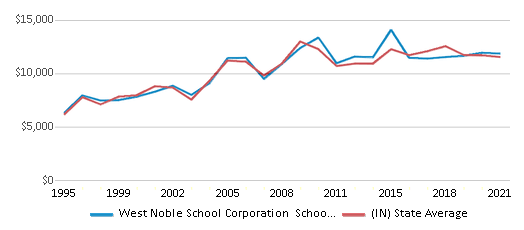
Spending / Student
$10,918
$12,844
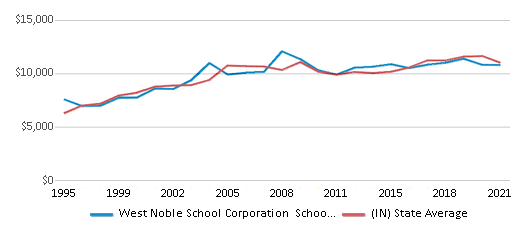
Best West Noble School Corporation School District Public Preschools (2025)
School
(Math and Reading Proficiency)
(Math and Reading Proficiency)
Location
Grades
Students
Rank: n/an/a
500 W Union St
Ligonier, IN 46767
(260) 894-3191
Ligonier, IN 46767
(260) 894-3191
Grades: PK-1
| 342 students
Recent Articles

Sexual Harassment at Age 6: The Tale of a First Grade Suspension
A six-year old in Aurora, Colorado, was suspended after singing an LMFAO song to a little girl in his class and reportedly “shaking his booty.” We look at the case and the sexual harassment problem in public schools today.

How Scaffolding Could Change the Way Your Child Learns
This article explores the concept of instructional scaffolding, a teaching method that enhances learning by breaking down complex tasks into manageable parts. It highlights how scaffolding supports students in developing critical thinking skills and becoming more independent learners. The article discusses the benefits of scaffolding, including improved engagement and reduced anxiety, and provides strategies for its implementation across various educational levels.

February 05, 2025
Understanding the U.S. Department of Education: Structure, Impact, and EvolutionWe explore how the Department of Education shapes American education, from its cabinet-level leadership to its impact on millions of students, written for general audiences seeking clarity on this vital institution.





